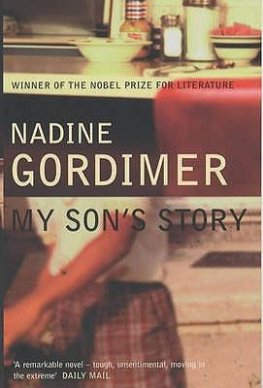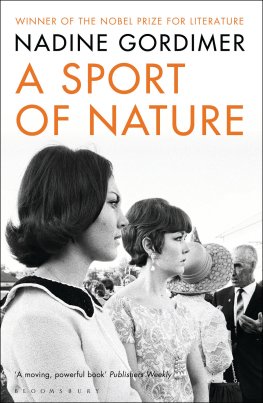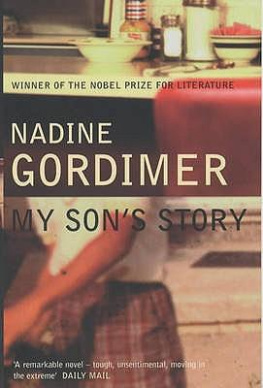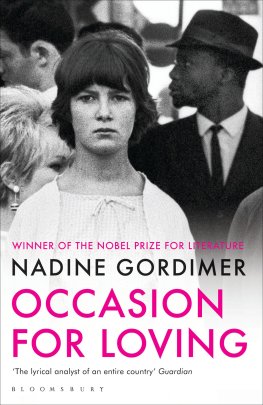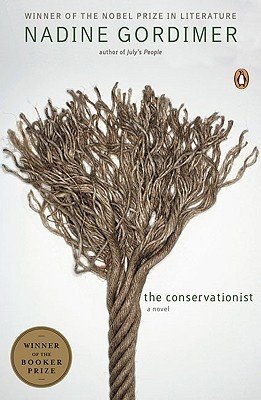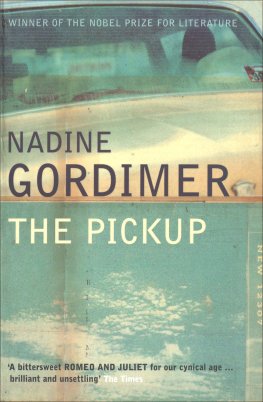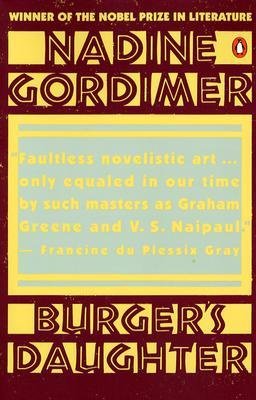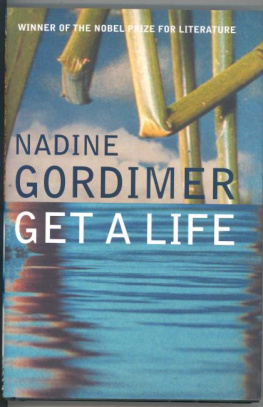JULYS PEOPLE
NADINE GORDIMER

The old is dying and the new cannot be born; in this interregnum there a rises a great diversity of morbid symptoms.
Antonio Gramsci
Prison Notebooks
Contents
You like to have some cup of tea?
July bent at the doorway and began that day for them as his kind has always done for their kind.
The knock on the door. Seven oclock. In governors residences, commercial hotel rooms, shift bosses company bungalows, master bedrooms en suite the tea-tray in black hands smelling of Lifebuoy soap. The knock on the door
no door, an aperture in thick mud walls, and the sack that hung over it looped back for air, sometime during the short night. Bam, Im stifling; her voice raising him from the dead, he staggering up from his exhausted sleep.
No knock; but July, their servant, their host, bringing two pink glass cups of tea and a small tin of condensed milk, jaggedly-opened, specially for them, with a spoon in it.
No milk for me.
Or me, thanks.
The black man looked over to the three sleeping children bedded-down on seats taken from the vehicle. He smiled confirmation: They all right.
Yes, all right.As he dipped out under the doorway: Thank you, July, thank you very much.
She had slept in round mud huts roofed in thatch like this before. In the Kruger Park, a child of the shift boss and his family on leave, an enamel basin and ewer among their supplies of orange squash and biscuits on the table coming clear as this morning light came. Rondavels adapted by Bams ancestors on his Boer side from the huts of the blacks. They were a rusticism true to the continent; before air-conditioning, everyone praised the natural insulation of thatch against heat. Rondavels had concrete floors, thickly shined with red polish, veined with trails of coarse ants; in Botswana with Bam and his guns and hunters supply of red wine. This one was the prototype from which all the others had come and to which all returned: below her, beneath the iron bed on whose rusty springs they had spread the vehicles tarpaulin, a stamped mud and dung floor, above her, cobwebs stringy with dirt dangling from the rough wattle steeple that supported the frayed grey thatch. Stalks of light poked through. A rim of shady light where the mud walls did not meet the eaves; nests glued there, of a brighter-coloured mudwasps, or bats. A thick lip of light round the doorway; a bald fowl entered with chicks cheeping, the faintest sound in the world. Its gentleness, ordinariness produced sudden, total disbelief. Maureen and Bam Smales. Bamford Smales, Smales, Caprano & Partners, Architects. Maureen Hetherington from Western Areas Gold Mines. Under 10s Silver Cup for Classical and Mime at the Johannesburg Eisteddfod. She closed her eyes again and the lurching motion of the vehicle swung in her head as the swell of the sea makes the land heave underfoot when the passenger steps ashore after a voyage. She fell asleep as, first sensorily dislocated by the assault of the vehicles motion, then broken in and contained by its a-rhythm, she had slept from time to time in the three days and nights hidden on the floor of the vehicle.
People in delirium rise and sink, rise and sink, in and out of lucidity. The swaying, shuddering, thudding, flinging stops, and the furniture of life falls into place. The vehicle was the fever. Chattering metal and raving dance of loose bolts in the smell of the childrens car-sick. She rose from it for gradually longer and longer intervals. At first what fell into place was what was vanished, the past. In the dimness and traced brightness of a tribal hut the equilibrium she regained was that of the room in the shift bosss house on mine property she had had to herself once her elder sister went to boarding-school. Picking them up one by one, she went over the objects of her collection on the bookshelf, the miniature brass coffeepot and tray, the four bone elephants, one with a broken trunk, the khaki pottery bulldog with the Union Jack painted on his back. A lavender-bag trimmed with velvet forget-me-nots hung from the upright hinge of the adjustable mirror of the dressing-table, cut out against the window whose light was meshed by minute squares of the wire flyscreen, clogged with mine dust and dead gnats. The dented silver stopper of a cut-glass scent bottle was cemented to the glass neck by layers and years of dried Silvo polish. Her school shoes, cleaned by Our Jim (the shift bosss name was Jim, too, and so her mother talked of her husband as My Jim and the house servant as Our Jim), were outside the door. A rabbit with a brown patch like a birthmark over one eye and ear was waiting in his garden hutch to be fed As if the vehicle had made a journey so far beyond the norm of a present it divided its passengers from that the master bedroom en suite had been lost, jolted out of chronology as the room where her returning consciousness properly belonged: the room that she had left four days ago.
The shapes of pigs passed the doorway and there were calls in one of the languages she had never understood. Once, she knewshe always knewher husband was awake although still breathing stertorously as a drunk. She heard herself speak.
Where is it?She was seeing, feeling herself contained by the vehicle.
He said hide it in the bush.
Another time she heard something between a rustling and a gnawing. What? Whats that?
He didnt answer. He had driven most of the time, for three days and three nights. If no longer asleep, stunned by the need of sleep.
She slowly began to inhabit the hut around her, empty except for the iron bed, the children asleep on the vehicle seatsthe other objects of the place belonged to another category: nothing but a stiff rolled-up cowhide, a hoe on a nail, a small pile of rags and part of a broken Primus stove, left against the wall. The hen and chickens were moving there; but the slight sound she heard did not come from them. There would be mice and rats. Flies wandered the air and found the eyes and mouths of her children, probably still smelling of vomit, dirty, sleeping, safe.
The vehicle was a bakkie, a small truck with a three-litre engine, fourteen-inch wheels with heavy-duty ten-ply tyres, and a sturdy standard chassis on which the buyer fits a fibreglass canopy with windows, air-vents and foam-padded benches running along either side, behind the cab. It makes a cheap car-cum-caravan for white families, generally Afrikaners, and their half-brother coloureds who cant afford both. For more affluent white South Africans, it is a second, sporting vehicle for purposes to which a town car is not suited.
It was yellow. Bam Smales treated himself to it on his fortieth birthday, to use as a shooting-brake. He went trapshooting to keep his eye in, out of season, and when winter came spent his weekends in the bush, within a radius of two hundred kilometres of his offices and home in the city, shooting guinea-fowl, red-legged partridge, wild duck and spur-wing geese. Before the children were born, he had taken his wife on hunting trips farther afieldto Botswana, and once, before the Portuguese rgime was overthrown, to Moambique. He would no sooner shoot a buck than a man; and he did not keep any revolver under his pillow to defend his wife, his children or his property in their suburban house.
The vehicle was bought for pleasure, as some women are said to be made for pleasure. His wife pulled the face of tasting something that set her teeth on edge, when he brought it home. But he defended the dyed-blonde jauntiness; yellow was cheerful, it repelled heat.
They stood round it indulgently, wife and family, the children excited, as it seemed nothing else could excite them, by a new possession. Nothing made them so happy as buying things; they had no interest in feeding rabbits. She had smiled at him the way she did when he spurted ahead of her and did what he wanted; a glimpse of the self that does not survive coupling. Anything will spot you a mile off, in the bush.
Next page

